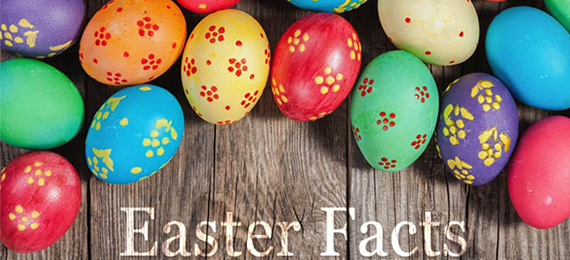
Easter Sunday or Resurrection Sunday is around the corner. Easter is an important festival for Christians. The celebration involves decorating eggs, cooking delicious hams, and creating beautiful baskets. Before you plan for a delicious brunch, why not uncover the unique Easter traditions, origins, history, and other unknown interesting facts about Easter.
Interesting Easter Facts That Will Surprise You
The custom of Easter celebrations has evolved over the years. Everyone knows that it is the day of celebration for Jesus being resurrected from the dead. This year you can host a trivia night by adding all these fun facts about Easter and see who all can answer these Easter facts and trivia. You can also impress your friends and family by sharing these little-known Easter fun facts.
We have put together some important Easter Sunday facts that you can learn and teach the kids through playing quizzes. Keep scrolling to learn Easter history facts.
What Do Easter Baskets Symbolize?
- A. Fertility
- B. Love
- C. Gift
- D. None of the Above
1. Easter Baskets Have Unique Symbolism
The Easter eggs represent fertility, new life, and rebirth in many countries.
It is believed that Eostre carried a basket that was filled with eggs to support fertility. Eggs and Seedlings were connected to new life, so baskets represented new life as well. Later, people adopted these customs in Christianity.
2. Easter Eggs Associated with the Medieval Age
Some evidence proved Easter eggs originated from Medieval Europe. Christians did not actually start the tradition of giving eggs. The eggs are a symbol of rebirth and fertility in many cultures.
3. Dyed Eggs Represent the Blood of Jesus Christ
According to Orthodox and Eastern Catholic Churches, eggs are dyed red to signify the blood of Jesus before distributed to the congregant. These dyed eggs are blessed and give to supplicants. These eggs are created with natural items such as tree bark, onion peels, juices, and flower petals.
4. Good Friday Is Only Honored in Some States.
Good Friday is not a federal holiday. Only 12 out of 50 United States observe this day as a holiday. Delaware, Connecticut, Hawaii, Florida, Indiana, Louisiana, Tennessee, New Jersey, North Dakota, North Carolina, Kentucky, and Texas declared Good Friday as a holiday.
5. Every Easter American Spend $1.9 Billion
You will be surprised to learn that Americans spend $1.9 billion to purchase Easter candy, making it the second-highest candy holiday after Halloween.
It is estimated that on every Easter, people in the United States spend $131, on average.
6. Origin of Easter Bunny In US
The first story of a rabbit hiding eggs in the garden was published in 1680.
The custom of the egg-giving hare was introduced in the United States in the 18th century.
7. Easter Is Named for the Anglo-Saxon Fertility Goddess
Several historians believe that the term Easter was derived from Eostre, a pagan Anglo-Saxon goddess of fertility. Eostre also referred to as “Eastre,” had associated with two other important Easter items such as hares and eggs.
8. The Easter Bunny Was First Introduced in German
During the middle ages, both eggs and hares were symbols of fertility in German. In this period, the bunny gives candy, and the legend of egg-laying was invented. In the 1700s, the first Germans who immigrated to the US introduced the Easter bunny tradition to the country.
9. The World’s Largest Easter Egg Weight Is 5000lbs
The world’s largest Easter egg weighs 5000lbs, 18ft wide, and 31ft tall, produced in Alberta, Vegreville, and Vegreville. It took 12,000 hours to finish.
10. Over 1.5 Million Cadbury Creme Eggs Are Made Every Day.
Bournville factory in Birmingham produces 500 million Cadbury Creme Eggs every year.